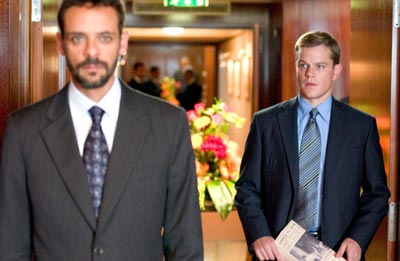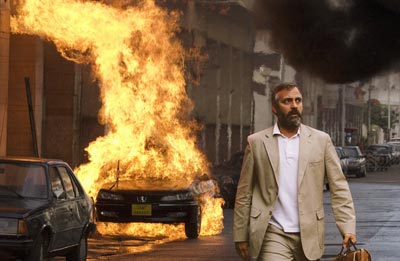Syriana
Oil, oil everywhere and not a plot to think.

Everything is connected. Is it? So tell me something I don't know. Back in 2000 Stephen Gaghan's script for Traffic rightly drew no small amount of acclaim. That work took a long and interesting (if predictably Hollywood-buffed) look at the drug trade from multiple angles, from the producers to the suppliers, the corrupt cops to the dealers and, of course, the alarmingly inconspicuous end user. It's narrative was labyrinthine due largely to the complexity of the business it portrayed, and in this sense it served it's purpose very well indeed. Now we have Syriana, and not only is Gaghan behind the script but he's also behind the camera. this time the subject is the relationship between government, oil companies and the regimes of the Middle East, and once again the scripting is as twisting as a very twisty thing on National Twisty Day. Only this time it doesn't work so well.
Now, before I launch into a string of reasons as to why Syriana is nowhere near as enjoyable as perhaps it should be, let me first point out that it is an entirely acceptable exercise in film making, and in spirit at least it deserves all the praise it can garner for daring to approach such an incendiary subject at such an angle and in such a volatile world climate. There's no faulting the sentiment herein, and this reviewer happily acknowledges the need for some insightful exploration of the topic. Problem is, Syriana isn't half as insightful as it seems to think it is.

"Hang on!", you yell. "It certainly appears complex!". Well yes, but appearances are, as we know, often incredibly deceptive, and Gaghan's latest proves no exception. As is de rigueur these days, a predictably testing narrative introduces us to a diverse band of players whose antics both foreign and domestic play a part in shaping the hypothetical nouveau-Middle East of the title. Highest profile seems to have been granted one Mr. George Clooney Esquire as burnt-out CIA man Bob Barnes who operates out of the likes of Tehran and never, ever shaves. Small wonder he won an Oscar for his efforts. When he's not busy selling stinger missiles to individuals whose schemes best benefit the US administration at that particular moment, Barnes interacts with shady characters who like to pull out fingernails and cause all sorts of mischief either for or against the likes of Emir-to-be Prince Nasir Al-Subaai (Alexander Siddig), who in turn seeks the services of business and financial adviser Bryan Woodman (Matt Damon).
Parallel to these shenanigans the big oil companies, here represented in a J.R. Ewing stylee by the likes of Jimmy Pope (Chris Cooper) and Dean Whiting (Christopher Plummer) are merging under the watchful eye of government inspector Bennett Holiday (Jeffrey Wright), while thousands of miles away their dominance of the oil industry is inspiring young Muslim men to make good their life potential by taking Bob Barnes' stinger missiles and piloting them into tanker ships. There's little doubting that it's potentially explosive stuff (no pun intended), but the problem lies in Gaghan's convoluted scripting which, unlike Traffic, has little insightful purpose and instead serves only to mask a story we are all quite familiar with beneath a fake veneer of vague intellectualism.

I'm all for intelligent filmmaking, but here the writer-director isn't so much crediting his audience with some smarts as he is insinuating that if you can't keep up with his contortions you must be lacking in them. It's all very well passing exposition through hushed snatches of conversation through closed doors and sudden, shocking missile-based interventions by the omnipresent US government, but when it's used to try and convince an audience it didn't actually know all this stuff already I have a problem. Traffic's drugs trade is complex and largely unknown to the common man due to it's distinct lack of legality, and needs some complex audience involvement to convey the scope of it all. Oil, on the other hand, is an entirely legal trade, and essentially straight forward in that any shady dealings are consequently thrust in our faces on a daily basis by the press; are there really those out there who believe we're currently shafting Iraq over WMD rather than the advantageous foothold it offers in the Middle Eastern black gold market?
I doubt it, but clearly Gaghan thinks he's telling us something we're not already painfully aware of. Perhaps instead of hiding behind a big, sprawling and ultimately smug screenplay Syriana might have been better to play on it's audience's prior knowledge in order to manipulate our emotions of guilt which, on the strength of a screenplay which merely implies it, Gaghan would probably suggest we in the West should all be feeling. And on that, dear readers, I would agree. For the meantime however Syriana sits uncomfortably among the resurgent intellectualism, governmental and conspiracy genres as a bit of a white elephant, mysteriously drawing praise where frankly I myself can only muster general apathy. By no means a clunker but most definitely a huge missed opportunity, I am most angered by the fact it's critical success will probably deflect anyone from attempting to broach the subject again any time soon in a more fitting manner. Such is life.
I award this oil-coated red herring 3 out of 5 Slick Disko units
Matt Damon (Bryan Woodman)
Alexander Siddig (Prince Nasir Al-Subaai)
Christopher Plummer (Dean Whiting)
Jeffrey Wright (Bennett Holiday)
Chris Cooper (Jimmy Pope)